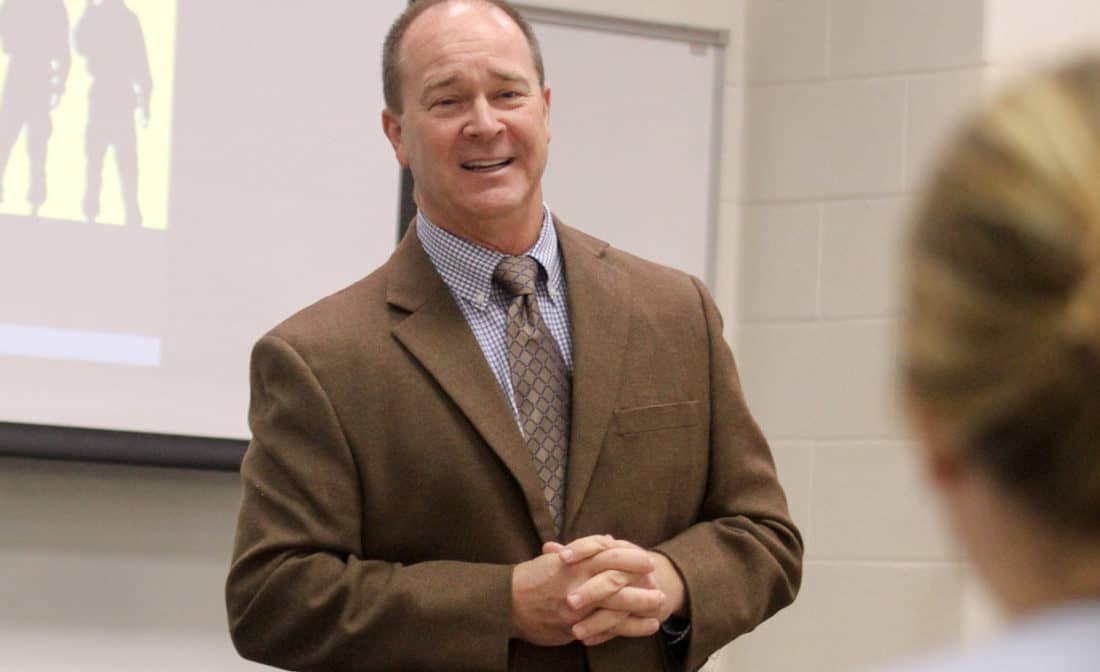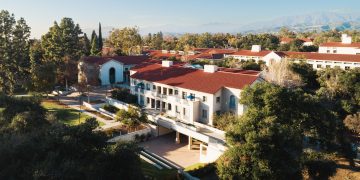Stephen Ross on Revitalizing the Green Zone Program at Virginia Commonwealth University
Colleges of Distinction’s mission is to help students from all backgrounds, identities, and experiences find the best well-rounded, inspiring undergraduate education for them. And so, we are excited to further highlight schools that dedicate resources to the service of one of our nation’s most underrepresented populations: service members and veterans of the military.
Institutions with the Military Support Recognition are aware of the unique challenges military students face on college campuses. These institutions are proud to support and cultivate the skills that military students bring to the classroom, all while helping them achieve their personal and professional goals.
Stephen Ross serves as the Military Student Services Director at Virginia Commonwealth University. In this interview, Ross and Ana-Marcela Lopez discuss revitalizing the Green Zone program at VCU, which was the first institution in the nation to implement this important initiative for student veterans.
Ana-Marcela Lopez, Colleges of Distinction: Stephen, can you tell me a little about your journey to working with veterans in higher education?
Ross: So I started off after four years in the air force. I went back to college that I graduated from. I was teaching and I was the assistant men’s soccer coach for a time, then transitioned to the head coach, and I taught on and off in the economics department. I created a career in the educational and athletic side. Then in 2005, I moved over to the administrative side of the athletic department and worked as an academic advisor for the athletes. That led to an opportunity at VCU, so it was a good opportunity to get to a bigger city, and my parents both lived in Richmond. Luckily this position opened up and I did well in the process to land it. So I’ve been here since 2015. When i first got here, we were in strategic enrollment management, so our role was to recruit and retain students, and bring in more veterans. Then after about a year, they moved us to student affairs, so the role changed. We then focused on supporting the students we have. Now, they’ve moved us back to enrollment management and challenged us to improve our ability to recruit and appeal to veterans. So we formed an advisory council and got three working groups and we’re trying to develop variations of some of the degrees to get students more academic credit for their work experience and their service transcripts.
We’re trying to improve our policies and procedures and improve how we’re viewed as a school. VCU is a large school, we have 30,000 students and a lot of degrees, but people don’t look at us and think military, because we are an inner city and fairly liberal school- art is one of the most popular degrees. But the reality is that there are a lot of things that do appeal to veterans here, so it’s about getting the word out. So that’s how I landed here. Like anybody else, I did my research when applying, and saw what they were doing with the job and the Green Zone. I realized it wasn’t really hitting the mark with what they wanted to accomplish. It was about a three hour briefing and an 80 page powerpoint. Who wants to sit through an 80 page powerpoint? I think it served its purpose at the time, but by the time I got here, most of the faculty and staff I talked to about it said yeah it’s really long and it’s good, but we don’t have three hours. That’s when we set out to revamp the Green Zone training. It’s just one of the things we’ve done to increase awareness for veterans on campus.
Lopez: What were your biggest goals in the revamp project? What do you think was the most important?
Ross: I wanted to excite people. I wanted people to come away from it and be able to reach out to other faculty and staff and say “man, I’m really glad I did that I learned a few things I didn’t know.” Virginia is a heavy veteran state. 10-12% of the population are veterans and we’re the number one growth state for female veterans. So, in my world, a lot of the people I know are veterans. At VCU it wasn’t necessarily that way, so there were a lot of misconceptions- people thought that every veteran has ptsd, or has a problem, etc. So when I first looked at the Green Zone training, I realized that it was very PTSD focused and veteran suicide driven and it was very negative. The language was focused on how you can help a veteran with problems, which implied that every veteran has those problems from day one, which is not always the case.
So as a result, I started work with one of our Communication students, who was also a member of Student Veterans of America. So I told him, let’s try and make it interesting. Let’s get people’s attention right from the start. Let’s change the dynamics to involve more people from the beginning. Originally, they had it set up to where you would put one veteran with a panel of other attendees and they would discuss a concept or idea, and it got some good work done, but it didn’t fill the void of all the unanswered questions out there. I did a lot of walking around campus and knocking on doors, saying “hey I see you have a Green Zone sticker, can you tell me about the training?” And they say that sticker was on the door when I got here, this used to be so and so’s office” so we started to put dates on the stickers.
We also wanted to recognize people who received the training. It’s not mandatory, but we wanted to offer recognition to those that went above and beyond by listing their names on our site. So that’s a little about what I wanted to do early on. It wasn’t earth shattering, it was simply about how to educate people who don’t know anything about the military. There are folks who don’t know the difference between Guard and Reserve, or what a veteran might face. A couple of the more important objectives were educating the faculty and staff. A professor might not see the need for Green Zone training because they have tenure or not believe in the wars these veterans fought in, but hey, it helps pay your paycheck, so to be blunt: money talks. So when the school is getting 10-14 million dollars a year from this special group, everybody should be wanting to listen about them. So one thing we put into the training was a little bit of education about how much money we bring from the GI bill, to prove that they deserve a voice.
Lopez: How does your team measure or document the changes in student and faculty relations?
Ross: We haven’t really done a lot of assessment. We actually started when we were in student affairs because it was required. But I’m not a huge fan of all the work it takes to do the assessment. I like the informal process of calling someone who did the training and asking “how was it? Did it help? What can we do better?” instead of surveys and questionnaires. I don’t take the typical academic approach. I focus more on what actually happens afterwards. We’ll give a Green Zone presentation and tell faculty if they have a student who is having problems or they think they have a student who’s a veteran but you aren’t sure: here’s our contact information. Reach out to us! We started to hear from people who attended, so we know that we’re reaching them and making a difference. One of the programs we did in conjunction with the Green Zone, and is kind of a spin off, is the lapel pin program. We started giving lapel pins to our faculty and staff that served. Much of the faculty and staff had no idea who of their colleagues had served, so when we started putting out these lapel pins the word was getting out. One of the reasons we did this is, so veteran students knew who they could turn to. We recognized early on that the faculty and staff wanted people to know that they served.
Lopez: I think that’s a great way to make student veterans feel welcome on campus. One of the obstacles they face is finding a welcoming and understanding community. Knowing that they have fellow students and professors that identify with them is important.
Ross: Absolutely. We’ve given about 250 lapel pins and invite faculty and staff to our veterans day events to interact with our students. Covid has changed so much this year, but we keep swinging the bat and hoping to get faculty and staff to interact with each other. We had one event that was set up by an English professor called “More than War Stories.” This professor knew a tech sergeant in the air force that had been deployed 14 times. He said that there were a lot of veterans that had stories that they wanted to share, but did not have the opportunity to do. So we worked with her to create an event at a local restaurant, and people got on stage and people started talking about their experiences. A lot of time it was something comical- about something that happened to them in the latrine or in processing or as a result of a mission that they were on. So that’s an example of a win for the community that involved faculty and staff. A lot of these events were related to the mission of Green Zone training of how to connect faculty and students.
Lopez: I read in a 2015 press release announcing your position as director of Military Student Services that you had a couple main goals:
1.To make sure internal operations to serve veteran students was as efficient as possible
2.To strengthen relationships with student organizations and community service opportunities, etc.
Are there any other best practices that your team has implemented that you’re particularly proud of?
Ross: Those were critical when we first got here. I walked into the back room and our certifying official had about 12 stacks of paper, which were student requests for benefits. We had no way of tracking anything. Typically the one on the top of the pile was addressed next, but it could have been from someone who submitted it yesterday as opposed to the one submitted three months ago at the bottom of the stack. So it took us about a year to develop an in house process. There was no software out there to track things. VA Once is the system we use to submit things to the VA, but there was nothing in house that helped us track our students. So we set out to do that. That has made things a lot easier, since we are totally online. Students can go in and submit their benefits with about 4 or 5 clicks. Making things as convenient as possible was a main goal.
Last year we were able to take 5 student veterans to Los Angeles for the National Student Veterans Conference. That was the most involvement we’ve had in any of our student groups. That led to a lot of initiatives from our students, but then covid hit. We saw a lot of excitement from veterans, which is great because they’re busy! They have families and jobs and they don’t always have the time to engage, so something I’ve tried to do is make them understand the importance of networking. So many vets are used to getting promoted by their performance, whereas in the civilian world it doesn’t always work like that. If you haven’t built a network, then you might not be able to move up. Veterans aren’t used to that so when they come to college they just go to class and go home so they’re missing the opportunity to connect with other students. So one thing we try to do is really demonstrate to students the importance of building networks. Whether it’s going to the gym together or studying together or coming to pizza day at our office, we want them to build their community.
We do some community service projects- the community has come together tremendously- even for me. My son Drew was killed in Afghanistan in 2018. I was sitting right here at this desk when I got the phone call. The whole VCU community- students, faculty members, and even the whole city of Richmond supported me. So when someone loses someone, the community is very supportive. One of the things that came as a result of his loss was me realizing that we have a lot of students here who have experienced loss of brothers and sisters in arms that impact them every year. So when my son’s birthday or anniversary rolls around it impacts me. So we’ve weaved that in the green zone training to educate faculty and staff about what affects student veterans.
Lopez: That’s so impactful. Throughout my research I’ve often reflected back to my own experience as an undergrad. I went to St. Edward’s here in Austin and there were many veterans in my classroom and I never thought anything of it. But now, I think back to what they might have been feeling or thinking in class. There is just a whole other world that they experience. So things like going to the career center or finding a study buddy just don’t come naturally to them. So if no one is there to guide them, then they miss out on those opportunities.
Ross: Right. They tend to look to their peers, so we make headway when we can get 30 or 40 of them to come to pizza day. The work study program that the VA provides is also helpful. We can employ students in our office so they can become leaders. I see my responsibility here to expose students to the different opportunities available. There’s a group here in Richmond called Tech for Troops and what they do is refurbish laptops and give them to veterans and even offer tech courses for veterans who need help.
Lopez: So I know Covid has thrown a wrench in everything, but is there anything on the horizon for VCU that you’re excited about?
Ross: Yeah! In March of last year, our president called a meeting and said I really wanna see us do more for our student veterans. We want to offer them more in the way of degrees and programs that appeal to them. We want to improve everything that we can. We want to be seen as a go to place. Hearing that from our president was music to my ears. So what he suggested we do, is we formed an advisory council of about 20 people, some being students. In the council there are working groups- one on policies and procedures with veterans so they address things like what happens if a student gets activated during deployment or in state cost vs out of state costs. WE have another group that looks at academic pathways and retention. WE took our top ten degrees and looked at what appeals to students and we started thinking about if we’re giving students enough credit for their service and if we can give them more.
Lopez: For military students, the college search is a different experience than that of traditional students. And terms like “military friendly” can be misleading. What are some key factors you would tell military students to keep in mind as they search for the right school for them?
Ross: I do think students need to take a close look at the military services office and see what sort of commitment the school makes to that office. I think understanding the population that the school is dealing with is important. Are any of the faculty and staff familiar with veterans? They probably get the best sense of that by talking to other veteran students at the university. I think it’s also important to understand the other support organizations around the university. The school can’t provide everything a student needs, so they need to see if the military office is partnering with surrounding organizations like Wounded Warriors that offer students ways to get involved.
This series of interviews features the knowledge, insight, and experiences of military and veteran affairs leaders in higher education. These individuals are paving the way for veterans in higher education through intentional programming, advocacy, and meaningful support. From Green Zone training to strategic partnerships, these campuses are creating spaces where military and veteran students can learn, grow, and succeed.




